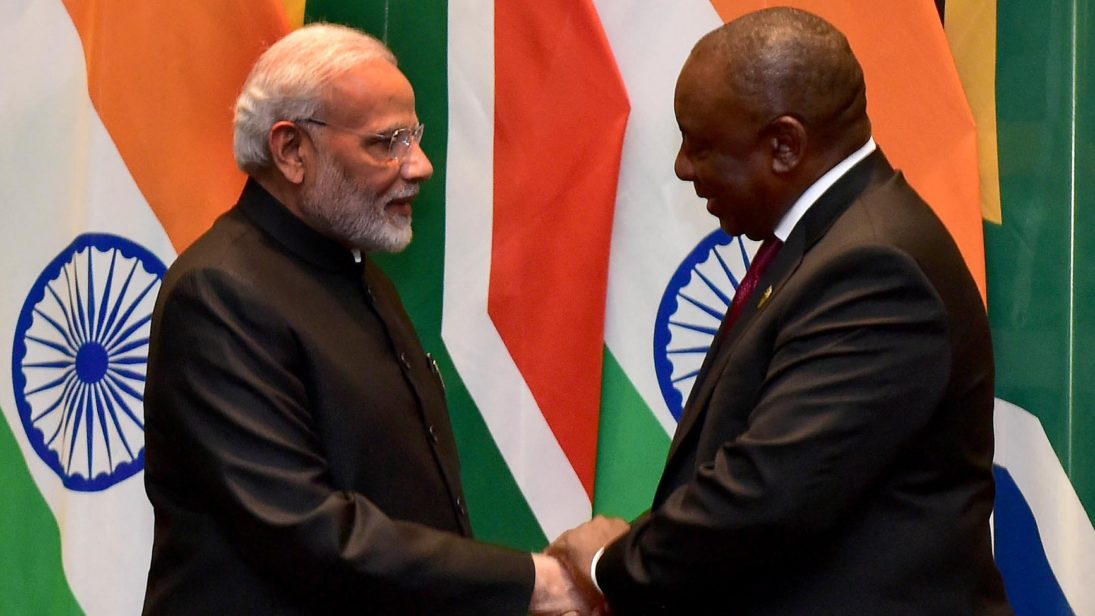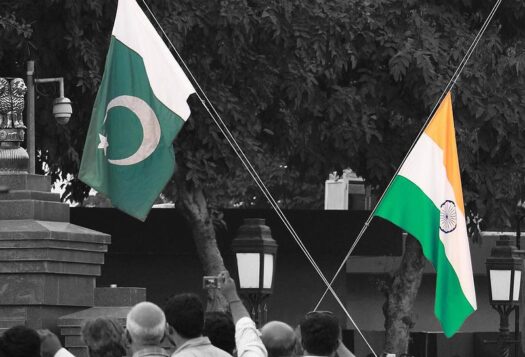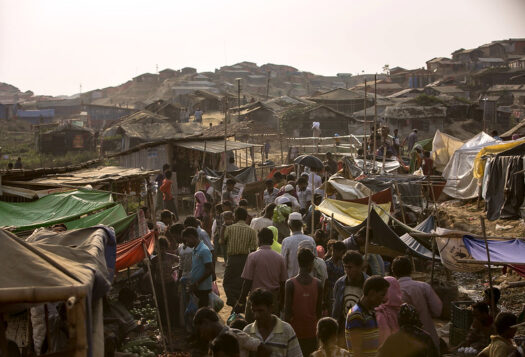
Indian Prime Minister Narendra Modi recently undertook a state visit to three African countries (Rwanda, Uganda, and South Africa), and concluded his tour by attending a two-day summit in Johannesburg with the other BRICS countries: Brazil, Russia, China, and South Africa. India’s deepening engagement with the African continent encompasses a variety of issues, including trade, maritime security threats, combating climate change, anti-terrorism efforts, United Nations reform, China’s presence in Africa, the presence of hydrocarbons in the continent, and more.
However, meaningful cooperation between India and African nations in the future will require a continual recalibration of India-Africa ties. Given the rapidly evolving international order, as seen in the expanding military and economic might of China and the increasing importance of the Indian Ocean Region, India should continue to reboot its relations with countries in Africa through a development-centered, country-specific approach to the continent, while avoiding monolithic, one-size-fits-all policies. In recalibrating its approach to the continent, India can play to the strengths of its capacity-building projects and pursue joint endeavors with partners like Japan, thereby advancing its objective of bolstering its soft power in Africa to counter the growing footprint of Chinese influence.
India’s Interests and Expanding Ties in Africa
To advance its strategic interests, India’s attention has increasingly begun to shift towards the African continent. In the last four years of the Modi government, Indian prime ministers, presidents, and vice presidents have made 23 visits to African countries. India’s attention has been particularly on East African countries, which form a part of the Indian Ocean littoral and can play a focal role in the Indo-Pacific as China’s influence grows in the region. Due to the strategic location of the countries near the Strait of Hormuz, a major chokepoint for international trade, India is cooperating with the countries to fight piracy and maintain free flow of trade. The Indian Navy also works with countries including Mauritius, Seychelles, and Mozambique to help patrol their waters. Considering East Africa as a gateway to the region, New Delhi has emphasized strengthening connectivity with African countries. Domestic projects like Sagarmala, which focuses on developing India’s blue economy and port connectivity, also include India’s extended neighborhood and align with its strategic imperative of being a defense supplier and logistic partner to the Indian Ocean region.
Economically, India-Africa relations have also achieved new heights, reflecting a shift in the larger economic policy of the Modi government. South Africa, Ghana, Nigeria, Tanzania, and Angola are key trading partners of India, and major items of export from India to African countries range from pharmaceuticals to vehicles. India imports 12 percent of its oil requirements from Nigeria, while Indian oil companies are also investing in countries including Côte D’Ivoire, Angola, Gabon, and Madagascar. India’s trade with Africa has been growing rapidly over the years, at the rate of nearly 32 percent annually from 2005 to 2011. During the 2014 World Economic Forum, Indian and African industrial leaders agreed to take India-Africa trade ties to $500 billion USD by 2020.

Continuing the Reboot
China’s increasing investment in the African continent through massive aid and infrastructure projects is a point of concern for India, given New Delhi’s vast and expanding strategic interests in African continent and the Indo-Pacific region. While it is true that India lacks sufficient resources to compete with Chinese investment in natural resource extraction and infrastructure development, New Delhi can play to its strengths to contend with China over influence in Africa. Indeed, policymakers in New Delhi should bear in mind both the strengths and weaknesses of both Chinese aid and India’s cooperation with various African countries in its reboot of its Africa policy.
The Modi government has already made significant progress to this end by prioritizing a development-oriented “skill diplomacy” approach across Africa. This approach has been proven successful in deepening country-to-country ties and avoiding a monolithic approach to the continent. Examples of this approach include partnerships between Indian and African universities such as the Ghana-India Kofi Annan Centre for Excellence in ICT and the Mahatma Gandhi Institute in Mauritius; setting up livelihood business centers as in Tanzania and Mozambique; and adopting a value chain approach to develop Ethiopia’s sugar industry. India can thus expand its soft power in Africa by promoting development programs, deepening its friendships with African countries and presenting itself as a different kind of partner than Beijing. To formulate these ad-hoc initiatives into a cohesive strategy, New Delhi could build upon these ongoing projects to develop an expansive program of small-scale capacity-building initiatives that would promote entrepreneurial skills development and training across the African continent.
In combination with a strategy for capacity-building, India can also partner with other countries to undertake larger-scale initiatives that resemble China’s own projects in Africa. New Delhi has already begun doing this, launching the second phase of the Feed the Future India Triangular Training Programme in 2016. This was an initiative developed in conjunction with the United States under which agricultural training will be provided to 1,500 specialists in Asia and Africa. India is also partnering with Japan in the Asia-Africa Growth Corridor to recalibrate its policy towards the continent, which is based on the principles of development and cooperation, improved infrastructure and connectivity, people-to-people ties, and capacity-building initiatives. Analysts have already drawn comparisons between this initiative and China’s Belt and Road Initiative, which Beijing has begun to promote in Africa. Through such partnerships, India can overcome its comparative deficiency in resources to expand its soft power footprint, deepen its relationships, and compete with Chinese investment across the continent.
Conclusion
Due to the geopolitical and geoeconomic shifts taking place in Africa, India must continue rebooting its Africa policy to ensure a mutually satisfying relationship between itself and the countries of Africa. While serving its own strategic and economic interests, India needs to also focus on the country-specific areas that demand attention by developing a capacity-building program that spans the African continent and promotes cooperation in sectors such as infrastructure and agriculture through joint endeavors with partners like Japan. India’s aim should not be to replicate the Chinese game in Africa. However, New Delhi, in its own capacity, should create a sustainable brand for India that will enhance confidence in its intentions for the continent.
***
Image 1: GovernmentZA via Flickr (cropped)
Image 2: Roberto Schmidt via Getty


